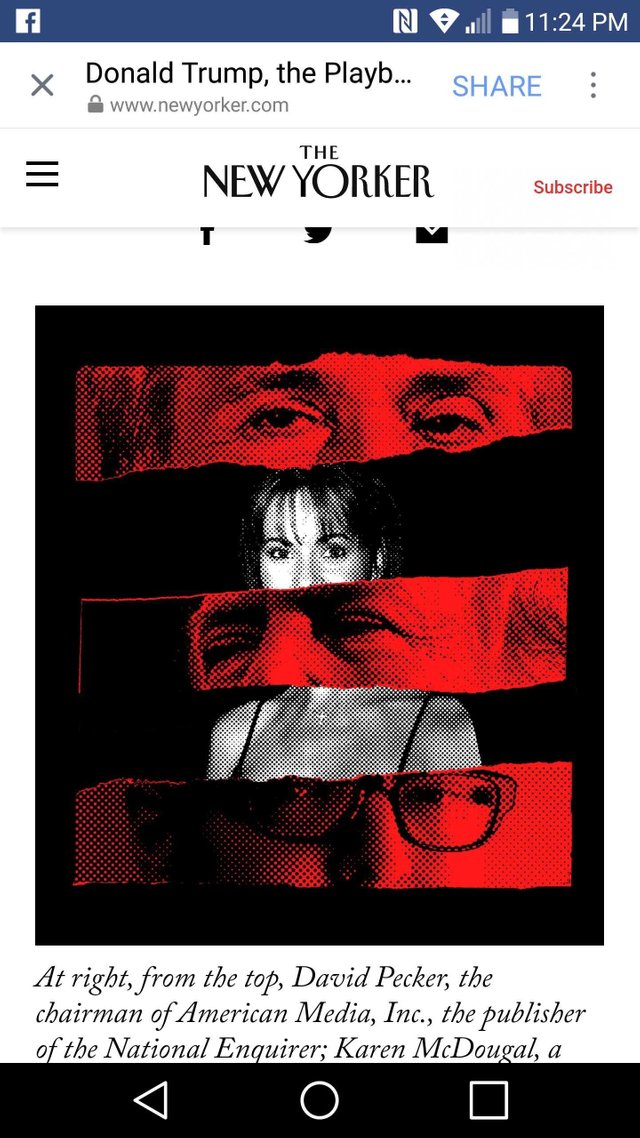Illustration by Oliver Munday; Source Photographs: Jesse Grant / WireImage / Getty (McDougal); Mark Peterson / Redux for The New Yorker (Pecker); Jamie Squire / Getty (Trump); Lucas Jackson / Reuters (Howard)
In June, 2006, Donald Trump taped an episode of his reality-television show, “The Apprentice,” at the Playboy Mansion, in Los Angeles. Hugh Hefner, Playboy’s publisher, threw a pool party for the show’s contestants with dozens of current and former Playmates, including Karen McDougal, a slim brunette who had been named Playmate of the Year, eight years earlier. In 2001, the magazine’s readers voted her runner-up for “Playmate of the ’90s,” behind Pamela Anderson. At the time of the party, Trump had been married to the Slovenian model Melania Knauss for less than two years; their son, Barron, was a few months old. Trump seemed uninhibited by his new family obligations. McDougal later wrote that Trump “immediately took a liking to me, kept talking to me - telling me how beautiful I was, etc. It was so obvious that a Playmate Promotions exec said, ‘Wow, he was all over you - I think you could be his next wife.’ ”
Trump and McDougal began an affair, which McDougal later memorialized in an eight-page, handwritten document provided to The New Yorker by John Crawford, a friend of McDougal’s. When I showed McDougal the document, she expressed
surprise that I had obtained it but confirmed that the handwriting was her own.
The interactions that McDougal outlines in the document share striking similarities with the stories of other women who claim to have had sexual relationships with Trump, or who have accused him of propositioning them for sex or sexually harassing them. McDougal describes their affair as entirely consensual. But her account provides a detailed look at how Trump and his allies used clandestine hotel-room meetings, payoffs, and complex legal agreements to keep affairs—sometimes multiple affairs he carried out simultaneously—out of the press.
On November 4, 2016, four days before the election, the Wall Street Journal reported that American Media, Inc., the publisher of the National Enquirer, had paid a hundred and fifty thousand dollars for exclusive rights to McDougal’s story, which it never ran. Purchasing a story in order to bury it is a practice that many in the tabloid industry call “catch and kill.” This is a favorite tactic of the C.E.O. and chairman of A.M.I., David Pecker, who describes the President as “a personal friend.” As part of the agreement, A.M.I. consented to publish a regular aging-and-fitness column by McDougal. After Trump won the Presidency, however, A.M.I.’s promises largely went unfulfilled, according to McDougal. Last month, the Journal reported that Trump’s personal lawyer had negotiated a separate agreement just before the election with an adult-film actress named Stephanie Clifford, whose screen name is Stormy Daniels, which barred her from discussing her own affair with Trump. Since then, A.M.I. has repeatedly approached McDougal about extending her contract.
McDougal, in her first on-the-record comments about A.M.I.’s handling of her story, declined to discuss the details of her relationship with Trump, for fear of violating the agreement she reached with the company. She did say, however, that she regretted signing the contract. “It took my rights away,” McDougal told me. “At this point I feel I can’t talk about anything without getting into trouble, because I don’t know what I’m allowed to talk about. I’m afraid to even mention his name.”
A White House spokesperson said in a statement that Trump denies having had an affair with McDougal: “This is an old story that is just more fake news. The President says he never had a relationship with McDougal.” A.M.I. said that an amendment to McDougal’s contract—signed after Trump won the election—allowed her to “respond to legitimate press inquiries” regarding the affair. The company said that it did not print the story because it did not find it credible.
Six former A.M.I. employees told me that Pecker routinely makes catch-and-kill arrangements like the one reached with McDougal. “We had stories and we bought them knowing full well they were never going to run,” Jerry George, a former A.M.I. senior editor who worked at the company for more than twenty-five years, told me. George said that Pecker protected Trump. “Pecker really considered him a friend,” George told me. “We never printed a word about Trump without his approval.” Maxine Page, who worked at A.M.I. on and off from 2002 to 2012, including as an executive editor at one of the company’s Web sites, said that Pecker also used the unpublished stories as “leverage” over some celebrities in order to pressure them to pose for his magazines or feed him stories. Several former employees said that these celebrities included Arnold Schwarzenegger, as reported by the Los Angeles Times, and Tiger Woods. (Schwarzenegger, through an attorney, denied this claim. Woods did not respond to requests for comment.) “Even though they’re just tabloids, just rags, it’s still a cause of concern,” Page said. “In theory, you would think that Trump has all the power in that relationship, but in fact Pecker has the power—he has the power to run these stories. He knows where the bodies are buried 
Authors get paid when people like you upvote their post.
If you enjoyed what you read here, create your account today and start earning FREE STEEM!
If you enjoyed what you read here, create your account today and start earning FREE STEEM!
Hi! I am a robot. I just upvoted you! I found similar content that readers might be interested in:
https://www.newyorker.com/news/news-desk/donald-trump-a-playboy-model-and-a-system-for-concealing-infidelity-national-enquirer-karen-mcdougal
Downvoting a post can decrease pending rewards and make it less visible. Common reasons:
Submit